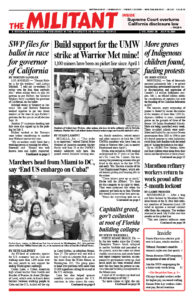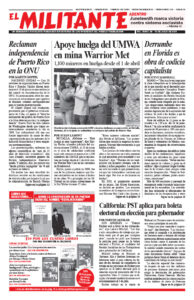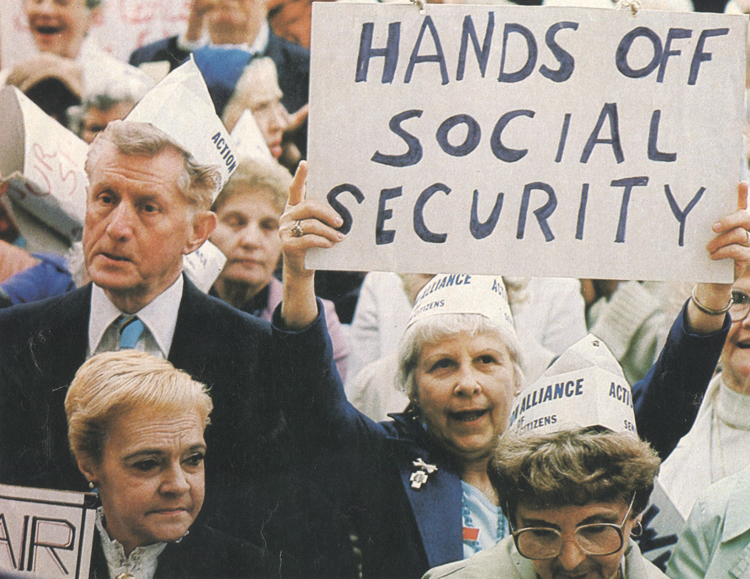Capitalism’s World Disorder: Working-Class Politics at the Millennium by Jack Barnes is one of Pathfinder’s Books of the Month for July. Barnes is the national secretary of the Socialist Workers Party. The excerpt is from the section “Bondholders and the ‘National Debt’” in Chapter 4. It contrasts how workers see debt as a crushing burden while the ruling rich see owning debt as a profitable asset. Copyright © 1999 by Pathfinder Press. Reprinted by permission.
BY JACK BARNES
Yes, the U.S. rulers are worried about the budget deficit. When a government deficit remains very large as a percentage of overall production, one of two things (or some combination of the two) has to happen: either taxation will increase, or the national currency is devalued. The capitalist class does not like either one to happen.
The propertied families do not like to raise taxes — especially income or wealth-related taxes — because taxation is a deduction from surplus value, so that puts further downward pressure on their profit rates. To most workers, it seems strange to say that taxes come out of surplus value. When we look at our paystubs, it seems like a lot of taxes come out of our wages. And that perception reflects the social reality of regressive taxation under capitalism, whereby the form of all sorts of levies is a very real burden on workers. Socialists are for lifting all taxes from the shoulders of working people. From the origins of the modern communist workers movement, we have advocated a steeply graduated income tax that falls only on the capitalists and better-off professional and middle classes.
Scientifically, however, most of what are usually called taxes ultimately comes out of the capitalists’ surplus value. Under a given relationship of class forces between capital and labor, if the government squeezes too much from our paychecks in the form of taxes, then the capitalists simply end up over time having to raise wages in order to compensate. So, the rulers do not like to see taxation go up more than absolutely necessary to maintain a government that can act to defend the interests of their class.
The capitalists do not like to devalue the currency either. That makes it much more difficult and expensive for them to attract funds into the country that they can use as capital to make more profits for themselves and compete with their rivals.
The great bulk of the wealth of the imperialist ruling classes today is held in debt. It is hard for workers to get comfortable with this idea, since it is so far-removed from our own experience with debt. Workers associate debt with economic pressure, not wealth. We say to ourselves: “I’ve got some debts. I owe MasterCard a couple of thousand dollars and my brother-in-law a few hundred bucks. What does that have to do with being wealthy?”
But alas! That is the difference between classes. That is the difference between those who live off surplus value and those whose labor produces it.
Interest-bearing bonds is the form in which the capitalists hold most of this debt. And what the bondholders fear above all is that the value of their bonds will be driven down by currency devaluation. At about the same time Abraham Lincoln was getting ready to announce the Emancipation Proclamation some 130 years ago, he started pumping out “greenbacks” — the first nationwide paper currency in U.S. history — to finance the Northern war effort. At that time, Lincoln won the agreement of northern capitalists to do so by agreeing that government bonds would be paid off in gold specie, not in devalued slips of paper. For most of the time since then, however, the coupon-clippers have had to tally their capital gains or losses in dollars, so they view currency devaluation as a theft of wealth just short of outright expropriation!
That is why farmers and small businessmen — always deep in debt — support inflationary policies and fall for the populist demagogy of those who rail against “the cross of gold” and offer “cheap money” as the solution to the ills of the common man. Because there are two ways to get rid of debt: either pay it back, or inflate it away. If the currency is debased enough, the value of the debt dwindles to little or nothing. …
So, the capitalist rulers are worried about the deficit and the national debt. What is of interest to the working class, however, is how they try to solve it. One of the biggest causes of the growing deficit, of course, is interest payments to the holders of U.S. Treasury bonds. The big capitalists in this country and abroad who hold that government debt are paid some $200 billion each year, some 15 percent of the federal budget — more than all government spending on education, transportation, food stamps, housing, and aid to families with dependent children combined. But those payments will not be touched.
Instead, the capitalist parties clamp down harder and harder on the working class and increase exploitation. Above all, they are taking aim today at the social rights working people have won. As a by-product of the mass social movement that built the industrial unions in the 1930s, and then of the civil rights battles of the 1950s and 1960s, working people in the United States won the right to a minimum level of lifetime income security.
What became known as the Social Security system in the United States was the opposite of any kind of charity, which is all that most workers previously had to rely on once meager family resources were spent. It was the opposite of what is called “welfare” today — paltry sums doled out to working people on the basis of degrading means tests and invasion of privacy by so-called social workers. Social Security was something different. It was a social wage paid out over a worker’s entire lifetime in the form of jobless benefits, disability pay, and a pension. …
[T]his social wage is among the capitalists’ central targets. But the rulers find it politically difficult to attack these gains head-on, since tens of millions of working people, and many in the middle classes, now consider these gains to be universal social rights.


